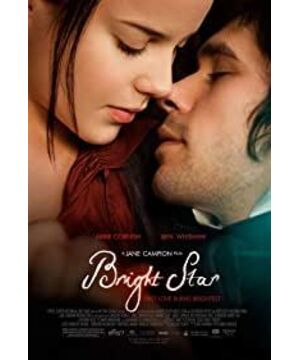Keats asks in "For a long-time city dweller", "What could be more pleasant than reading a gentle and melancholy romance novel?" Campia's new book "Bright Star" is this A gentle and melancholy novel, only the protagonist of the novel has been replaced by Keats himself. But I couldn't help sobbing. It was far from being as pleasant as Keats had said. There was grief in the low-pitched violin, and sometimes it went up and down like a nightingale, but it never changed its gloomy character.
I like the singing at the beginning, like sacred music, it has a feeling of cleansing evil. The needle and thread are shuttled up and down the linen, and the slenderness of the hand is always more poetic than the industrial assembly line.
In that shot, everyone in the house talked about Keats and his poetry, with sympathy and amusement. Fanny turned around and walked into the corridor, gently smoothing her hair in front of the makeup mirror. The chatter was still in her ears, but the corridor was so quiet that there was a distinction between the city and the valley between the outside and the inside. Kampia's brushstrokes are delicate and gentle. She never ridicules the world, but she never stings her praises in front of her loved ones. During the dance, Fanny moved slightly, and the gentle invitation contained wisdom, restraint, and admiration. His poems and his people were like a mystery, touching the girl's heart. Kampia must have touched the heart of a girl, like Fanny, to the man who once wrote, "If I were handsome, my sighs would quickly sway through that exquisite jade shell - your ears, find your heart" of people are fascinated. It's just that the former uses oil painting-like beauty to write affection, while the latter expresses love in the gaps of needles and threads. Campia two hundred years later, Fanny two hundred years ago, but now they have the same mind, which is a kind of romance in itself.
I have read Keats's poems translated by Mr. Mudan countless times. It is suitable for people in the beginning of love and also for me in my 30s. In my opinion, romanticism is still in my age but will soon fade away. thing. If you don't say anything at this time, it might be inappropriate to say it again. The beauty of Keats's poems lies not in their connotations, but in the rhythm of those verses, which are smooth and loose like the foam that runs across our skin; sometimes they are like dance steps, which pay attention to the elegance of their verses and gestures, and sometimes they are like sacred music. Pay attention to the ups and downs of chanting. Although the translation is not as catchy as the English version, there is a certain divinity in Chinese that is agitated by Mr. Mu Dan. Perhaps, poetry is closer to God. Campia's images, on the other hand, are like the soft and undulating breasts of women, more sensual, like the emotional emotions that we can grasp but are often out of control in our bodies.
Pillowcases sewed overnight and wrapped, hanging contemplation on the withered branches, are the best memory for the deceased and the best comfort for the living. I like the subtlety of the British, and there is always a kind of abruptness and recklessness in expressing one's heart directly. Like that pillowcase, and this letterhead. Keats must have glanced back before leaving Finney's house. Her disappointment was caught in his sadness, and the so-called congenial smells and hearts were probably born in this look back.
Keats told me that love can make people sensitive, suspicious and even crazy. He questioned the innocent Fanny in the heavy rain, and she chose silence. Silence does not mean guilt, nor does it mean disarming. Sometimes my silence can be exchanged for my lover's hysteria, and she will think it's speechless after a lie has been exposed. Just like Fanny in front of you, eyes fixed on you, silent, then turned away. Silence is sometimes grievance, a sense of absurdity after being misunderstood, and a daze that is hard to figure out. The more reluctant I asked, the more I fell in the opposite direction. Keats asked her, "Can we have another poetry class tomorrow?" In exchange for the girl's resistance, "No! I just want to dance and flirt, talk about dresses and ribbons, and get back my happiness and happiness. A sense of humour." Perhaps, love hurts the most when it wants to say something but doesn't say it.
- and the happiest. Fanny's family moved next door to Keats, and finally there was only one wall apart. And the wall is like the foe of the gaze, which can never penetrate its stubbornness and hardness. But how can love be easily blocked? The percussion here, there is a response, the ears are close to the wall, and it seems to hear each other's gasps and the little joy in their hearts. The strings of the violin play leisurely, and it looks like a poet's meditation is stored in it. The swaying in the silence filled the originally empty space with happiness. Happiness, a word that was too mediocre to say, was glorious at this time.
However, in the realm of love, happiness has a face good at promises and betrayals. As long as it is tainted by poverty, it becomes filthy, and it will haggle with you, and sometimes even hide it from the sky. Sometimes what we can't afford is not love, but the vanity of love. Those who cannot be beaten by poverty will always be unforgettable. Just like this "Bright Star", I couldn't help chanting it, telling me, be strong:
Bright Star! I pray to be as steadfast as you -
but I do not want to hang high in the night sky alone
, with my eyes open forever,
Like a patient, sleepless hermit in nature,
constantly looking at the surging sea, the priest of the earth,
washing the shores inhabited by man with holy water
or watching the fluttering snow, like a veil,
brilliant and light, covering the valleys and mountains -Oh
, no, -I just want to rest my head firmly on my
lover's soft breast, and
feel it ever soothingly descend and rise;
and wake up, full of sweet excitement in my heart,
constantly, constantly listening. She breathed delicately,
and lived like this, or died in a coma.
I saw Keats kneeling firmly on the ground, begging for forgiveness. And why should poverty be forgiven? Some things that cannot be bought by wealth are eternal, such as love and death.
—Death was so close to him that his body could not stand the torture of poverty, and he suffered from severe lung disease. Coughing, that endless coughing, he seemed to be poisoned by Satan, and his weak body was punished by poverty.
In the film, I saw Keats made a promise to her even in the most difficult moments. An engagement ring is enough to keep a girl together for a lifetime. I remember watching Ji Xianlin's documentary, I was touched by that German girl, the landlord's daughter, how she would stay with a stranger for life for the verbal promise of a stranger, sitting at the window on the second floor looking forward to his return, day after day Year after year. I can't help but sigh, what suffering can compare to accepting that worldly gaze for a long time. In the eyes of the world, how can love hold up that heavy scale, I am grateful to Milan Kundera for bravely saying the words, "the unbearable lightness in life", which is the Bible in the eyes of countless good men and women.
Keats eventually went to Italy, saying, "We'll get married when we come back in the spring." I know that he has a sense of responsibility and conscience, and he also knows how false these words are, but he still said it, and then looked at her, looking at the haggard but sworn face. Sometimes lies are greater than truth.
In September 1929, the seriously ill Keats wrote this "Bright Star" on the blank page of Shakespeare's collection of poems, facing "A Lover's Compliant", and everyone knows who this poem is for. and do. In the first half of it I see a man's obedience to a woman, and the lustful fantasy of the second half is the pilgrimage of a dying man to the sacred carcass of his lover. It's so real, Keats once said, that "tactile touch has memory," isn't this sensual touch an ardent memory?
After Keats died, Fanny walked around the wasteland for several years, often into the night without ever taking off the ring.
"watch movie"
View more about Bright Star reviews











